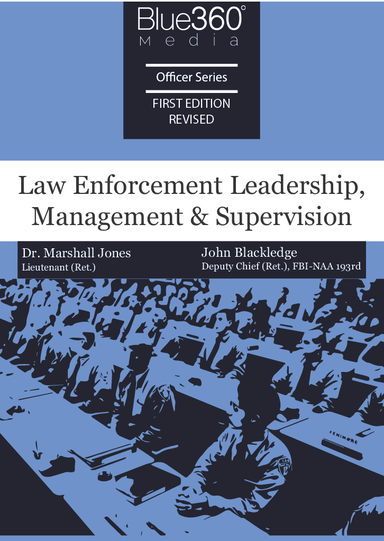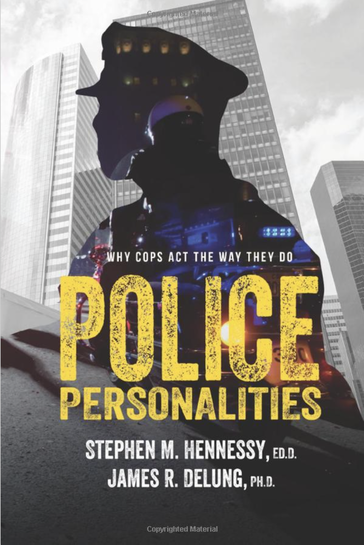- Marshall A. Jones, DBA
- CEO and Revision Author
- Assistant Professor and Founder
- Forensic Psychology, Florida Institute of Technology
- Director, The Center for Applied Criminal Case Analysis
- Palm Bay Police Department, Lieutenant (retired)

Dr. Marshall Jones seamlessly combines his extensive background as a law enforcement practitioner, trainer, and consultant with his rich experience in applied research to unravel the intricacies of individual and organizational behavior. A true practitioner at heart, Marshall considers himself an "accidental academic," having pursued graduate studies in criminology and industrial-organizational psychology while serving full-time in law enforcement. His academic journey also culminated in a doctorate in business administration. This unique multiciliary blend empowers him to fuse both data-driven insights with practical law enforcement perspectives to shape strategies and resolutions for his predominantly law enforcement clients.
Marshall has been a member of the Police Futures Working Group, an invited lecturer at the FBI NA, and speaker for several law enforcement leadership associations. His academic pursuits revolve around bridging the gap between theory and application, evident in his dynamic classroom presence, expert consulting, executive and leadership coaching, and his pioneering applied research initiatives. Over two decades, he has pioneered innovative research methodologies to investigate police recruitment and the nexus of both to leadership. Marshall's exceptional fusion of practitioner and academic facets led the FBI to engage him for his expertise in shaping prison interview teams and revolutionary methodologies for dissecting offender and victim data. These groundbreaking methodologies have played a pivotal role in shaping investigative processes and policy direction, underscoring his influence on law enforcement methodologies.
Marshall continues to serve as a sworn reserve, mostly supporting selection, training, policy review, and staff research. He is currently researching police recruiting and retention and leadership development issues. Training areas include leadership and management development, developing a Law Enforcement Leadership Pipeline, understanding human behavior, and managing implicit bias issues. Consulting activities include organizational and leader coaching, consulting, promotional exam development, leadership and succession planning, training development, problem analysis, and applied research.
Marshall has been a member of the Police Futures Working Group, an invited lecturer at the FBI NA, and speaker for several law enforcement leadership associations. His academic pursuits revolve around bridging the gap between theory and application, evident in his dynamic classroom presence, expert consulting, executive and leadership coaching, and his pioneering applied research initiatives. Over two decades, he has pioneered innovative research methodologies to investigate police recruitment and the nexus of both to leadership. Marshall's exceptional fusion of practitioner and academic facets led the FBI to engage him for his expertise in shaping prison interview teams and revolutionary methodologies for dissecting offender and victim data. These groundbreaking methodologies have played a pivotal role in shaping investigative processes and policy direction, underscoring his influence on law enforcement methodologies.
Marshall continues to serve as a sworn reserve, mostly supporting selection, training, policy review, and staff research. He is currently researching police recruiting and retention and leadership development issues. Training areas include leadership and management development, developing a Law Enforcement Leadership Pipeline, understanding human behavior, and managing implicit bias issues. Consulting activities include organizational and leader coaching, consulting, promotional exam development, leadership and succession planning, training development, problem analysis, and applied research.
Stephen M. Hennessy Ed.D.
- Developer and Author
- Former Special Agent, FBI
- Former Assistant Superintendent, Minnesota Bureau of Criminal Apprehension
- Former Training Administrator, Phoenix Police Department
- Associate Professor - Emeritus
- Department of Criminal Justice, St. Cloud State University

Dr. Hennessy began his law enforcement career in 1962 with the FBI, serving in administrative positions in Washington D.C. and Denver Colorado. In 1966 he was appointed a Special Agent and served in Houston, Texas and Newark, New Jersey. In 1973 he joined the Minnesota Bureau of Criminal Apprehension and was appointed Director of the Cooperative Area Narcotics Squad in Northern Minnesota. In 1977 he was appointed an Assistant Superintendent of the BCA overseeing, at various times, the investigations sections, the forensic laboratory, information systems, finance, budget and planning areas until his retirement in 1991.
He moved to Scottsdale, Arizona and established Leadership Inc. of Scottsdale where he consulted with numerous police agencies on the critical issues of policing a diverse society. He developed the Law Enforcement Personality Profile as a tool to help police administrators and officers realize and develop the leadership strengths they bring to the profession and to help in understanding the challenges they face in policing a culturally and racially diverse community.
He joined the Phoenix, Arizona Police Department in 1993 as the Training Administrator assigned to the Training Academy performing general administrative duties, designing curriculum, teaching, conducting research, and handling special projects. With the International Association of Chief’s of Police, he presented to and consulted with members of countless law enforcement agencies throughout the United States, Canada, and the Far East on cultural awareness and racial sensitivity matters from 1993 through 2005. He used the Law Enforcement Personality Profile as the core in aiding the successful curriculum development for this critically important topic.
In 2003 Dr. Hennessy joined the faculty at St. Cloud State University in the Department of Criminal Justice as an Associate Professor teaching in the undergraduate and graduate programs at the university. He retired and was awarded Emeritus status in 2016 as the Interim Director of the Public Safety Executive Leadership Master’s degree program.
He holds a Master’s Degree in Curriculum and Instruction and a Doctorate in Educational Leadership from The University of St. Thomas, St. Paul, Minnesota. He is the author of "Thinking Cop - Feeling Cop, A Study in Police Personalities", a co-author of “Police Personalities, Why Cops Act The Way They Do”, the lead author of "A Cultural Awareness Trainer's Manual for Law Enforcement Officers” and a chapter author in Dr. James Hendricks’ “Multicultural Perspectives in Criminal Justice and Criminology.” He has written extensively in the Cultural Awareness and Racial Sensitivity curriculum field for law enforcement. He is a past president of The Society of Police Futurists International and a 2003 Martin Luther King ‘Living the Dream” award winner for the City of Phoenix.
He moved to Scottsdale, Arizona and established Leadership Inc. of Scottsdale where he consulted with numerous police agencies on the critical issues of policing a diverse society. He developed the Law Enforcement Personality Profile as a tool to help police administrators and officers realize and develop the leadership strengths they bring to the profession and to help in understanding the challenges they face in policing a culturally and racially diverse community.
He joined the Phoenix, Arizona Police Department in 1993 as the Training Administrator assigned to the Training Academy performing general administrative duties, designing curriculum, teaching, conducting research, and handling special projects. With the International Association of Chief’s of Police, he presented to and consulted with members of countless law enforcement agencies throughout the United States, Canada, and the Far East on cultural awareness and racial sensitivity matters from 1993 through 2005. He used the Law Enforcement Personality Profile as the core in aiding the successful curriculum development for this critically important topic.
In 2003 Dr. Hennessy joined the faculty at St. Cloud State University in the Department of Criminal Justice as an Associate Professor teaching in the undergraduate and graduate programs at the university. He retired and was awarded Emeritus status in 2016 as the Interim Director of the Public Safety Executive Leadership Master’s degree program.
He holds a Master’s Degree in Curriculum and Instruction and a Doctorate in Educational Leadership from The University of St. Thomas, St. Paul, Minnesota. He is the author of "Thinking Cop - Feeling Cop, A Study in Police Personalities", a co-author of “Police Personalities, Why Cops Act The Way They Do”, the lead author of "A Cultural Awareness Trainer's Manual for Law Enforcement Officers” and a chapter author in Dr. James Hendricks’ “Multicultural Perspectives in Criminal Justice and Criminology.” He has written extensively in the Cultural Awareness and Racial Sensitivity curriculum field for law enforcement. He is a past president of The Society of Police Futurists International and a 2003 Martin Luther King ‘Living the Dream” award winner for the City of Phoenix.
Police Personalities
|
Law Enforcement Leadership, Management & Supervision
Written by Dr. Jones, Lt. (Ret.) and Deputy Chief (Ret.) Blackledge, Law Enforcement Leadership, Management & Supervision provides a robust mix of theory and practical application for current and aspiring sergeants, lieutenants - and those who aspire to higher command. Jones and Blackledge include best practices, along with illustrative case examples and self-assessments. |
|
WHY COPS ACT THE WAY THEY DO
By: Stephen M. Hennessy, Ed.D. (Author), James R. DeLung, Ph.D (Author) This book is an important addition to every police officer, recruit, or student of law enforcement’s knowledge base. It helps explain why cops act like cops. The turbulent environment in which law enforcement currently operates draws close scrutiny and occasional shrill criticism from the far right, the far left, and the political center. It is an essential read to help understand the various ways law enforcement officers take in information and make decisions. |


